brake sensor INFINITI QX56 2009 Factory Service Manual
[x] Cancel search | Manufacturer: INFINITI, Model Year: 2009, Model line: QX56, Model: INFINITI QX56 2009Pages: 4171, PDF Size: 84.65 MB
Page 12 of 4171

ACC-4
< REMOVAL AND INSTALLATION >
ACCELERATOR CONTROL SYSTEM
REMOVAL AND INSTALLATION
ACCELERATOR CONTROL SYSTEM
Removal and InstallationINFOID:0000000003771801
Adjustable Accelerator Pedal
CAUTION:
• Do not disassemble the accelerator pedal adjusting mechanism.
• Before removal and installation the accelerator and brake pedals must be in the frontmost position.
This is to align the base position of the accelerator and brake pedals.
• Do not disassemble the accelerator pedal assembly.
• Do not remove the accelerator pedal position sensor from the accelerator pedal bracket.
• Avoid damage from dropping the accel erator pedal assembly during handling.
• Keep the accelerator pedal assembly away from water.
REMOVAL
1. Move the accelerator and brake pedals to the frontmost position.
2. Turn the ignition switch OFF and disconnect the negative battery terminal.
3. Disconnect the adjustable brake pedal cable from the adjustable brake pedal. • Unlock, then pull the adjustable brake pedal cable to disconnect it from the adjustable brake pedal.
LBIA0379E
1. Adjustable accelerator pedal assem-
bly 2. A/T control cable mounting bracket (part
of the accelerator pedal assembly) 3. Adjustable pedal electric motor (part
of the accelerator pedal assembly)
4. Adjustable brake pedal cable (part of the accelerator pedal assembly)
Revision: December 20092009 QX56
Page 219 of 4171
![INFINITI QX56 2009 Factory Service Manual AV
DIAGNOSIS SYSTEM (AV CONTROL UNIT)AV-33
< FUNCTION DIAGNOSIS > [AUDIO SYSTEM]
C
D
E
F
G H
I
J
K L
M B A
O P
Sp ea ke r Tes t
Select “Speaker Test” to display the speaker diagnosis screen. Press INFINITI QX56 2009 Factory Service Manual AV
DIAGNOSIS SYSTEM (AV CONTROL UNIT)AV-33
< FUNCTION DIAGNOSIS > [AUDIO SYSTEM]
C
D
E
F
G H
I
J
K L
M B A
O P
Sp ea ke r Tes t
Select “Speaker Test” to display the speaker diagnosis screen. Press](/img/42/57031/w960_57031-218.png)
AV
DIAGNOSIS SYSTEM (AV CONTROL UNIT)AV-33
< FUNCTION DIAGNOSIS > [AUDIO SYSTEM]
C
D
E
F
G H
I
J
K L
M B A
O P
Sp ea ke r Tes t
Select “Speaker Test” to display the speaker diagnosis screen. Press
“Start” to generate a test tone in speakers. Touch “End” to stop the
test tones.
Navigation
STEERING ANGLE ADJUSTMENT
Adjustment of the steering angle output value detected by the gyro-
scope.
SPEED CALIBRATION
During normal driving, distance error caused by tire wear and tire
pressure change is automatically adj
usted for by the automatic dis-
tance correction function. This function, on the other hand, is for
immediate adjustment, in cases such as driving with tire chain fitted
on tires.
Diagnosis item Dis-
play Vehicle status
Remarks
Vehicle speed ON Vehicle speed > 0 km/h
Changes in indication may be delayed by approxi-
mately 1.5 seconds. This is normal.
OFF Vehicle speed = 0 km/h
− Ignition switch in ACC position
Parking brake ON Parking brake is applied.
OFF Parking brake is released.
Lights ON Light switch ON
Block the light beam from the auto light optical sensor.
OFF Light switch OFF
Ignition ON Ignition switch ON
—
OFF Ignition switch in ACC position
Reverse ON Selector lever in R position
Changes in indication may be delayed by approxi-
mately 1.5 seconds. This is normal.
OFF Selector lever in any position other
than R
− Ignition switch in ACC position
ALNIA0221GB
ALNIA0223GB
ALNIA0224GB
Revision: December 20092009 QX56
Page 295 of 4171
![INFINITI QX56 2009 Factory Service Manual AV
AV CONTROL UNITAV-109
< ECU DIAGNOSIS > [AUDIO SYSTEM]
C
D
E
F
G H
I
J
K L
M B A
O P
ECU DIAGNOSIS
AV CONTROL UNIT
Reference ValueINFOID:0000000003776891
VALUES ON THE DIAGNOSIS TOOL
CONSULT-III da INFINITI QX56 2009 Factory Service Manual AV
AV CONTROL UNITAV-109
< ECU DIAGNOSIS > [AUDIO SYSTEM]
C
D
E
F
G H
I
J
K L
M B A
O P
ECU DIAGNOSIS
AV CONTROL UNIT
Reference ValueINFOID:0000000003776891
VALUES ON THE DIAGNOSIS TOOL
CONSULT-III da](/img/42/57031/w960_57031-294.png)
AV
AV CONTROL UNITAV-109
< ECU DIAGNOSIS > [AUDIO SYSTEM]
C
D
E
F
G H
I
J
K L
M B A
O P
ECU DIAGNOSIS
AV CONTROL UNIT
Reference ValueINFOID:0000000003776891
VALUES ON THE DIAGNOSIS TOOL
CONSULT-III data monitor item
TERMINAL LAYOUT
PHYSICAL VALUES
Display Item Dis-
play Vehicle status
Remarks
VHCL SPD SIG ON Vehicle speed >0 km/h (0 MPH)
Changes in indication may be delayed. This is
normal.
OFF Vehicle speed =0 km/h (0 MPH)
PKB SIG ON Parking brake is applied.
Changes in indication may be delayed. This is
normal.
OFF Parking brake is released.
ILLUM SIG ON
Block the light beam from the auto
light optical sensor when the light
SW is ON.
—
OFF Expose the auto light optical sensor
to light when the light SW is OFF or
ON.
IGN SIG ON Ignition switch ON
—
OFF Ignition switch in ACC position
REV SIG ON Selector lever in R position
Changes in indication may be delayed. This is
normal.
OFF Selector lever in any position other
than R
ALNIA0670GB
Te r m i n a l
(Wire color) Description
ConditionReference value
(Approx.)
+ – Signal nameInput/
Output
1
(GR/L) Ground Amp. ON signal
OutputIgnition
switch ON —
Battery voltage
2
(LG) 3
(V) Pre-amp. audio signal front
LH
OutputIgnition
switch ON Audio output
SKIB3609E
Revision: December 20092009 QX56
Page 455 of 4171
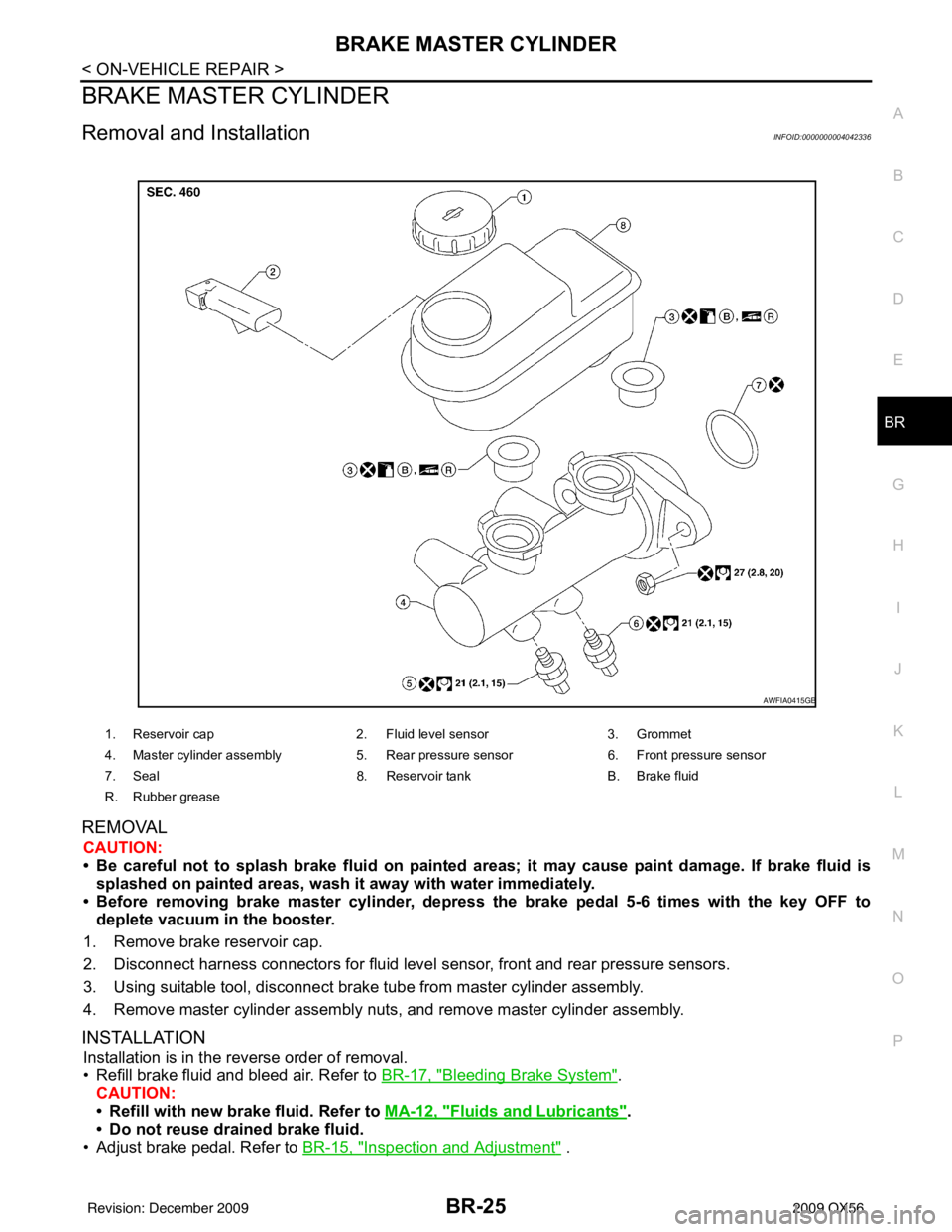
BRAKE MASTER CYLINDERBR-25
< ON-VEHICLE REPAIR >
C
DE
G H
I
J
K L
M A
B
BR
N
O P
BRAKE MASTER CYLINDER
Removal and InstallationINFOID:0000000004042336
REMOVAL
CAUTION:
• Be careful not to splash brake fluid on painted areas; it may cause paint damage. If brake fluid is
splashed on painted areas, wash it away with water immediately.
• Before removing brake master cylinder, depress the brake pedal 5-6 times with the key OFF to deplete vacuum in the booster.
1. Remove brake reservoir cap.
2. Disconnect harness connectors for fluid level sensor, front and rear pressure sensors.
3. Using suitable tool, disconnect brake tube from master cylinder assembly.
4. Remove master cylinder assembly nuts, and remove master cylinder assembly.
INSTALLATION
Installation is in the reverse order of removal.
• Refill brake fluid and bleed air. Refer to BR-17, "
Bleeding Brake System".
CAUTION:
• Refill with new brake fluid. Refer to MA-12, "
Fluids and Lubricants".
• Do not reuse drained brake fluid.
• Adjust brake pedal. Refer to BR-15, "
Inspection and Adjustment" .
1. Reservoir cap 2. Fluid level sensor 3. Grommet
4. Master cylinder assembly 5. Rear pressure sensor6. Front pressure sensor
7. Seal 8. Reservoir tankB. Brake fluid
R. Rubber grease
AWFIA0415GB
Revision: December 20092009 QX56
Page 456 of 4171
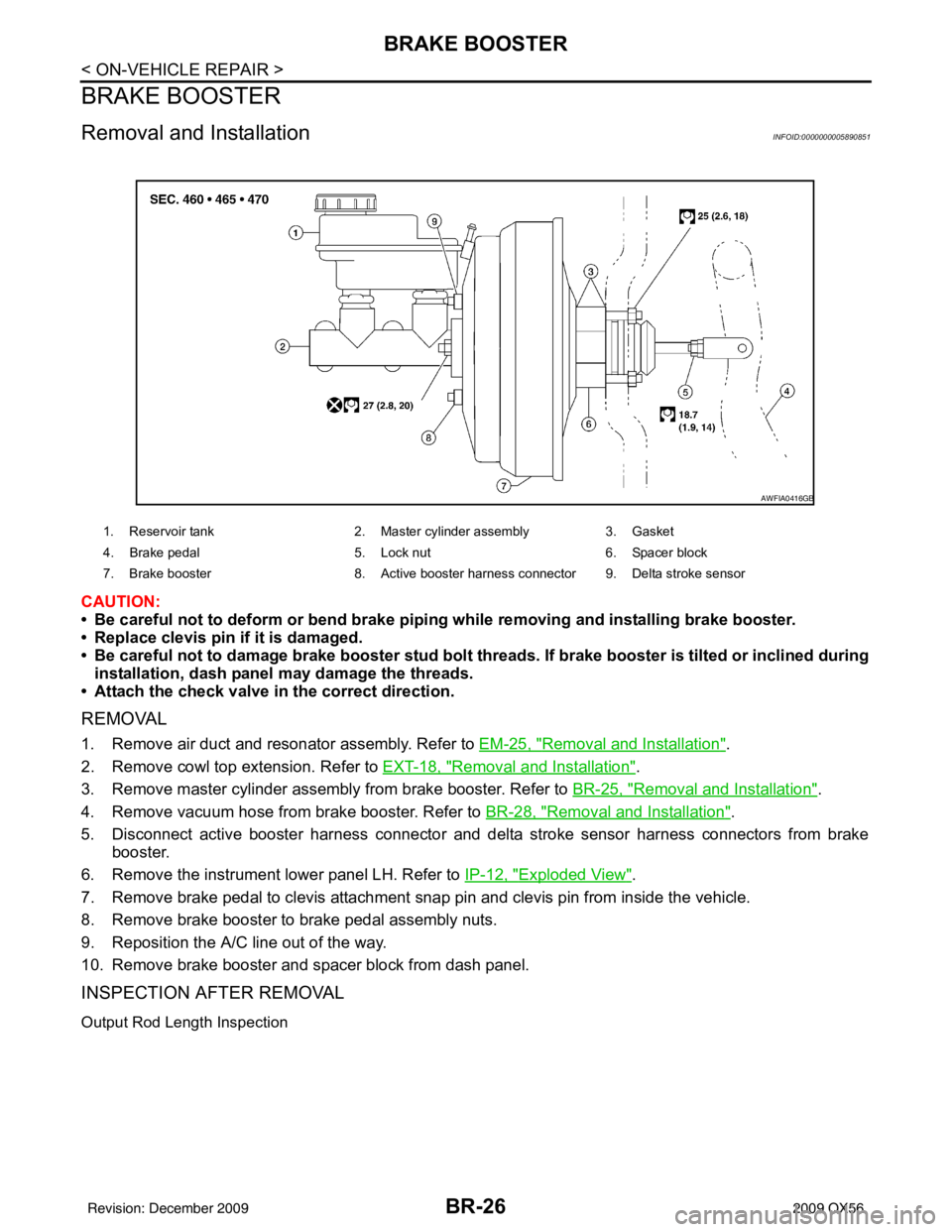
BR-26
< ON-VEHICLE REPAIR >
BRAKE BOOSTER
BRAKE BOOSTER
Removal and InstallationINFOID:0000000005890851
CAUTION:
• Be careful not to deform or bend brake piping while removing and installing brake booster.
• Replace clevis pin if it is damaged.
• Be careful not to damage brake booster stud bolt threads. If brake booster is tilted or inclined during
installation, dash panel may damage the threads.
• Attach the check valve in the correct direction.
REMOVAL
1. Remove air duct and resonator assembly. Refer to EM-25, "Removal and Installation".
2. Remove cowl top extension. Refer to EXT-18, "
Removal and Installation".
3. Remove master cylinder assembly from brake booster. Refer to BR-25, "
Removal and Installation".
4. Remove vacuum hose from brake booster. Refer to BR-28, "
Removal and Installation".
5. Disconnect active booster harness connector and delta stroke sensor harness connectors from brake booster.
6. Remove the instrument lower panel LH. Refer to IP-12, "
Exploded View".
7. Remove brake pedal to clevis attachment snap pin and clevis pin from inside the vehicle.
8. Remove brake booster to brake pedal assembly nuts.
9. Reposition the A/C line out of the way.
10. Remove brake booster and spacer block from dash panel.
INSPECTION AFTER REMOVAL
Output Rod Length Inspection
1. Reservoir tank 2. Master cylinder assembly3. Gasket
4. Brake pedal 5. Lock nut 6. Spacer block
7. Brake booster 8. Active booster harness connector 9. Delta stroke sensor
AWFIA0416GB
Revision: December 20092009 QX56
Page 457 of 4171
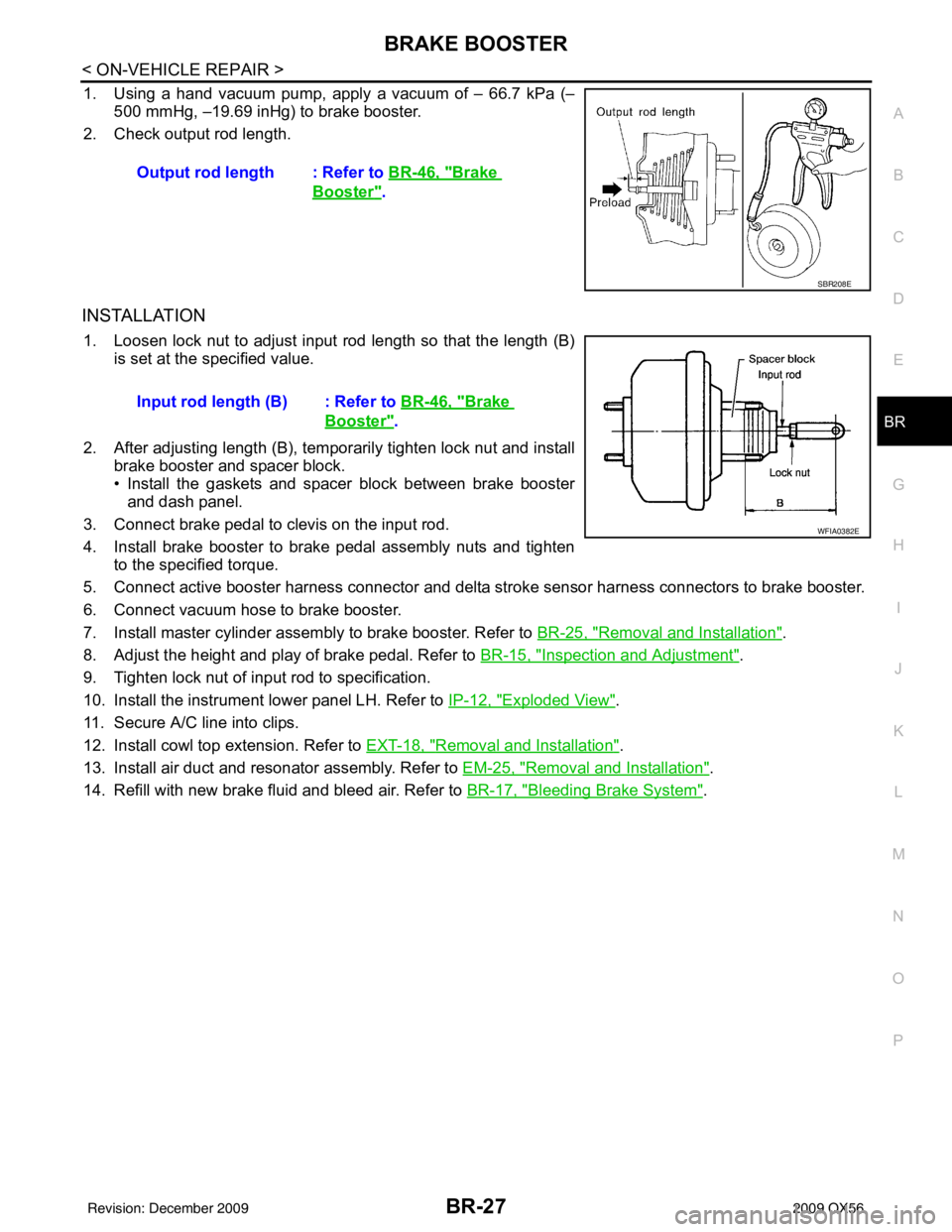
BRAKE BOOSTERBR-27
< ON-VEHICLE REPAIR >
C
DE
G H
I
J
K L
M A
B
BR
N
O P
1. Using a hand vacuum pump, apply a vacuum of – 66.7 kPa (– 500 mmHg, –19.69 inHg) to brake booster.
2. Check output rod length.
INSTALLATION
1. Loosen lock nut to adjust input r od length so that the length (B)
is set at the specified value.
2. After adjusting length (B), temporarily tighten lock nut and install brake booster and spacer block.
• Install the gaskets and spacer block between brake boosterand dash panel.
3. Connect brake pedal to clevis on the input rod.
4. Install brake booster to brake pedal assembly nuts and tighten to the specified torque.
5. Connect active booster harness connector and delta st roke sensor harness connectors to brake booster.
6. Connect vacuum hose to brake booster.
7. Install master cylinder assembly to brake booster. Refer to BR-25, "
Removal and Installation".
8. Adjust the height and play of brake pedal. Refer to BR-15, "
Inspection and Adjustment".
9. Tighten lock nut of input rod to specification.
10. Install the instrument lower panel LH. Refer to IP-12, "
Exploded View".
11. Secure A/C line into clips.
12. Install cowl top extension. Refer to EXT-18, "
Removal and Installation".
13. Install air duct and resonator assembly. Refer to EM-25, "
Removal and Installation".
14. Refill with new brake fluid and bleed air. Refer to BR-17, "
Bleeding Brake System".
Output rod length : Refer to
BR-46, "
Brake
Booster".
SBR208E
Input rod length (B) : Refer to BR-46, "Brake
Booster".
WFIA0382E
Revision: December 20092009 QX56
Page 459 of 4171
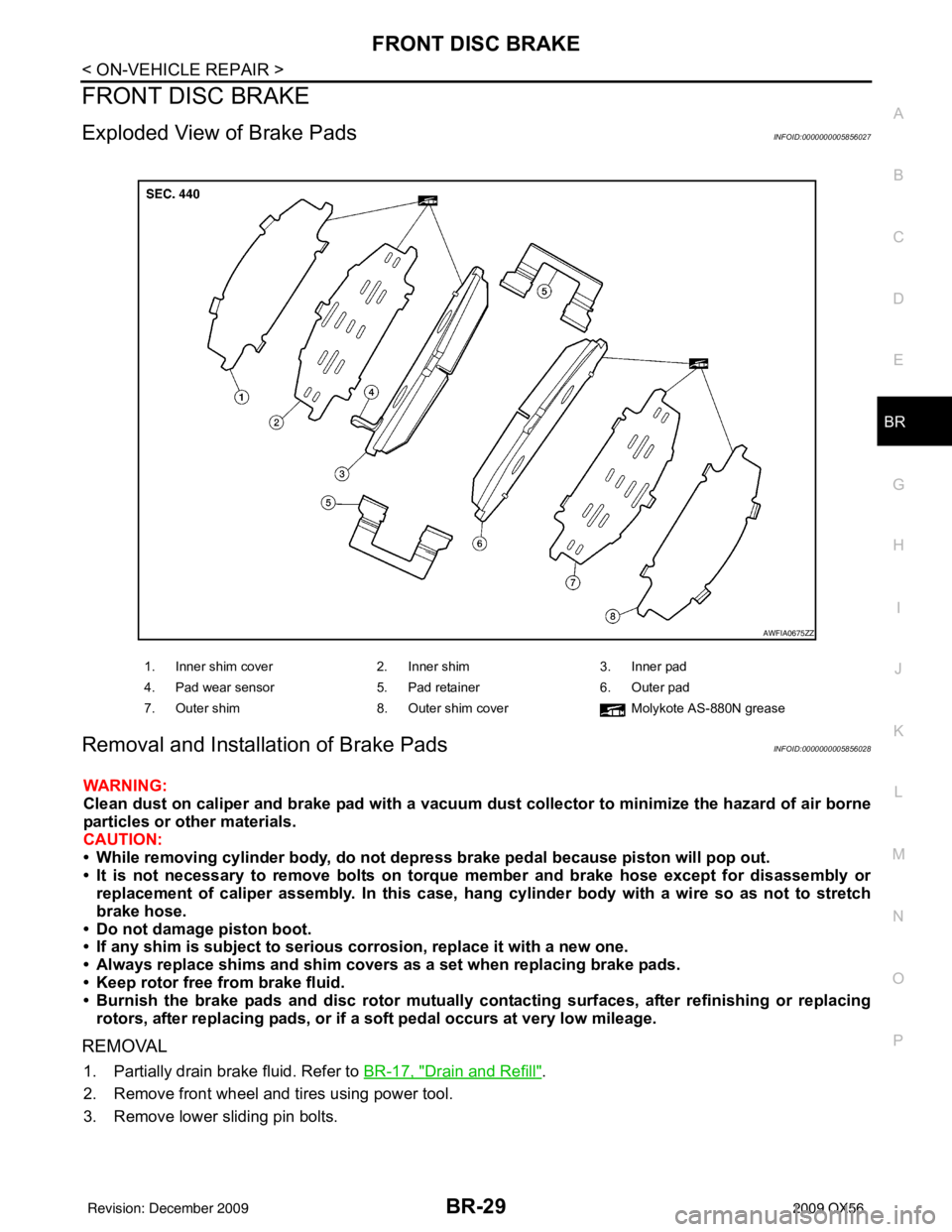
FRONT DISC BRAKEBR-29
< ON-VEHICLE REPAIR >
C
DE
G H
I
J
K L
M A
B
BR
N
O P
FRONT DISC BRAKE
Exploded View of Brake PadsINFOID:0000000005856027
Removal and Installation of Brake PadsINFOID:0000000005856028
WARNING:
Clean dust on caliper and brake pad with a vacuum dust collector to minimize the hazard of air borne
particles or other materials.
CAUTION:
• While removing cylinder bod y, do not depress brake pedal because piston will pop out.
• It is not necessary to remove bolts on torque member and brake hose except for disassembly or replacement of caliper assembly. In this case, hang cylinder body with a wire so as not to stretch
brake hose.
• Do not damage piston boot.
• If any shim is subject to serious corrosion, replace it with a new one.
• Always replace shims and shim covers as a set when replacing brake pads.
• Keep rotor free from brake fluid.
• Burnish the brake pads and disc rotor mutually contacting surfaces, after refinishing or replacing rotors, after replacing pads, or if a so ft pedal occurs at very low mileage.
REMOVAL
1. Partially drain brake fluid. Refer to BR-17, "Drain and Refill".
2. Remove front wheel and tires using power tool.
3. Remove lower sliding pin bolts.
1. Inner shim cover 2. Inner shim3. Inner pad
4. Pad wear sensor 5. Pad retainer6. Outer pad
7. Outer shim 8. Outer shim cover Molykote AS-880N grease
AWFIA0675ZZ
Revision: December 20092009 QX56
Page 460 of 4171
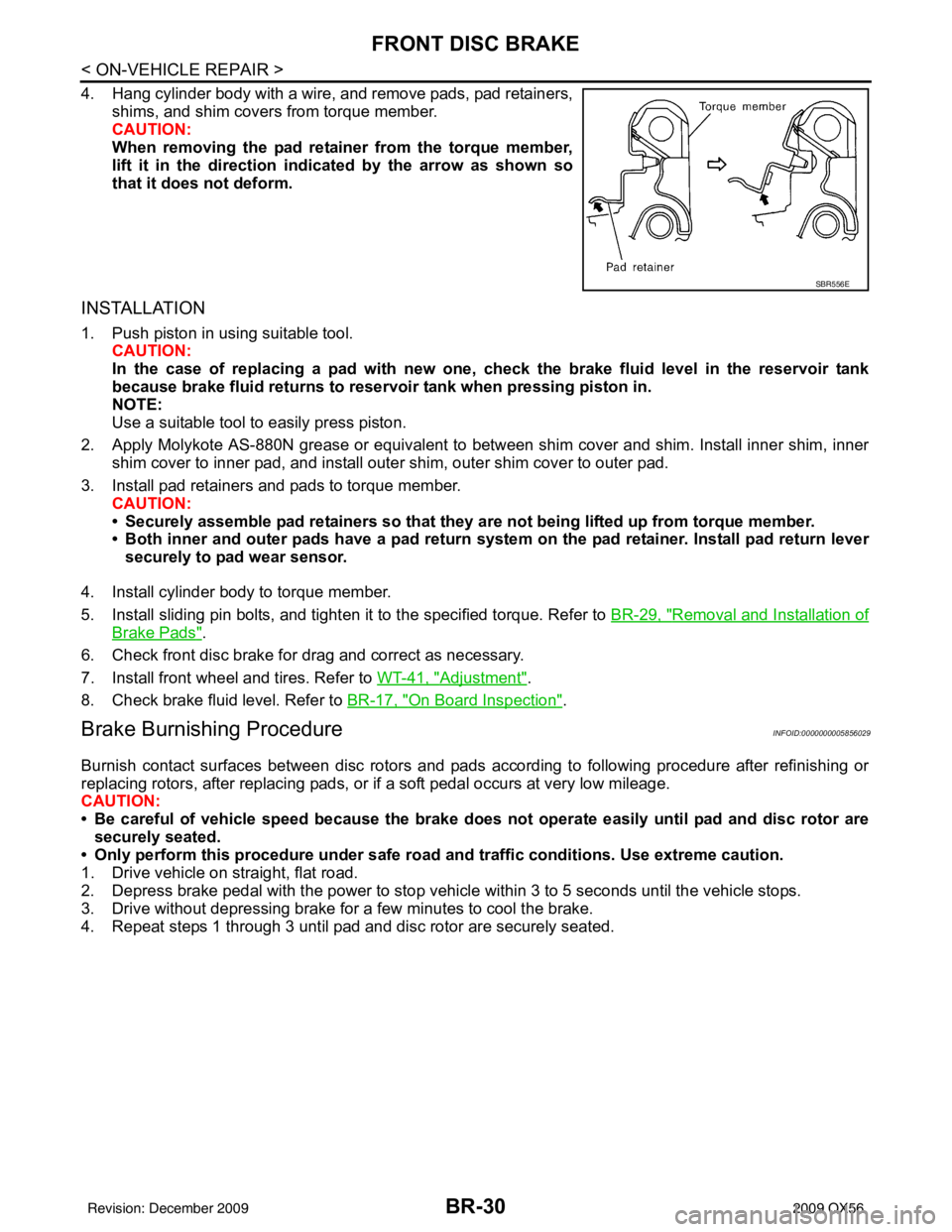
BR-30
< ON-VEHICLE REPAIR >
FRONT DISC BRAKE
4. Hang cylinder body with a wire, and remove pads, pad retainers,shims, and shim covers from torque member.
CAUTION:
When removing the pad retainer from the torque member,
lift it in the direction indi cated by the arrow as shown so
that it does not deform.
INSTALLATION
1. Push piston in using suitable tool.
CAUTION:
In the case of replacing a pad with new one, ch eck the brake fluid level in the reservoir tank
because brake fluid returns to reservoir tank when pressing piston in.
NOTE:
Use a suitable tool to easily press piston.
2. Apply Molykote AS-880N grease or equivalent to between shim cover and shim. Install inner shim, inner shim cover to inner pad, and install outer shim, outer shim cover to outer pad.
3. Install pad retainers and pads to torque member. CAUTION:
• Securely assemble pad retainers so that they ar e not being lifted up from torque member.
• Both inner and outer pads have a pad return system on the pad retainer. Install pad return lever
securely to pad wear sensor.
4. Install cylinder body to torque member.
5. Install sliding pin bolts, and tighten it to the specified torque. Refer to BR-29, "
Removal and Installation of
Brake Pads".
6. Check front disc brake for drag and correct as necessary.
7. Install front wheel and tires. Refer to WT-41, "
Adjustment".
8. Check brake fluid level. Refer to BR-17, "
On Board Inspection".
Brake Burnishing ProcedureINFOID:0000000005856029
Burnish contact surfaces between disc rotors and pads according to following procedure after refinishing or
replacing rotors, after replacing pads, or if a soft pedal occurs at very low mileage.
CAUTION:
• Be careful of vehicle speed because the brake does not operate easily until pad and disc rotor are securely seated.
• Only perform this procedure under safe road and traffic conditions. Use extreme caution.
1. Drive vehicle on straight, flat road.
2. Depress brake pedal with the power to stop vehicle within 3 to 5 seconds until the vehicle stops.
3. Drive without depressing brake for a few minutes to cool the brake.
4. Repeat steps 1 through 3 until pad and disc rotor are securely seated.
SBR556E
Revision: December 20092009 QX56
Page 467 of 4171
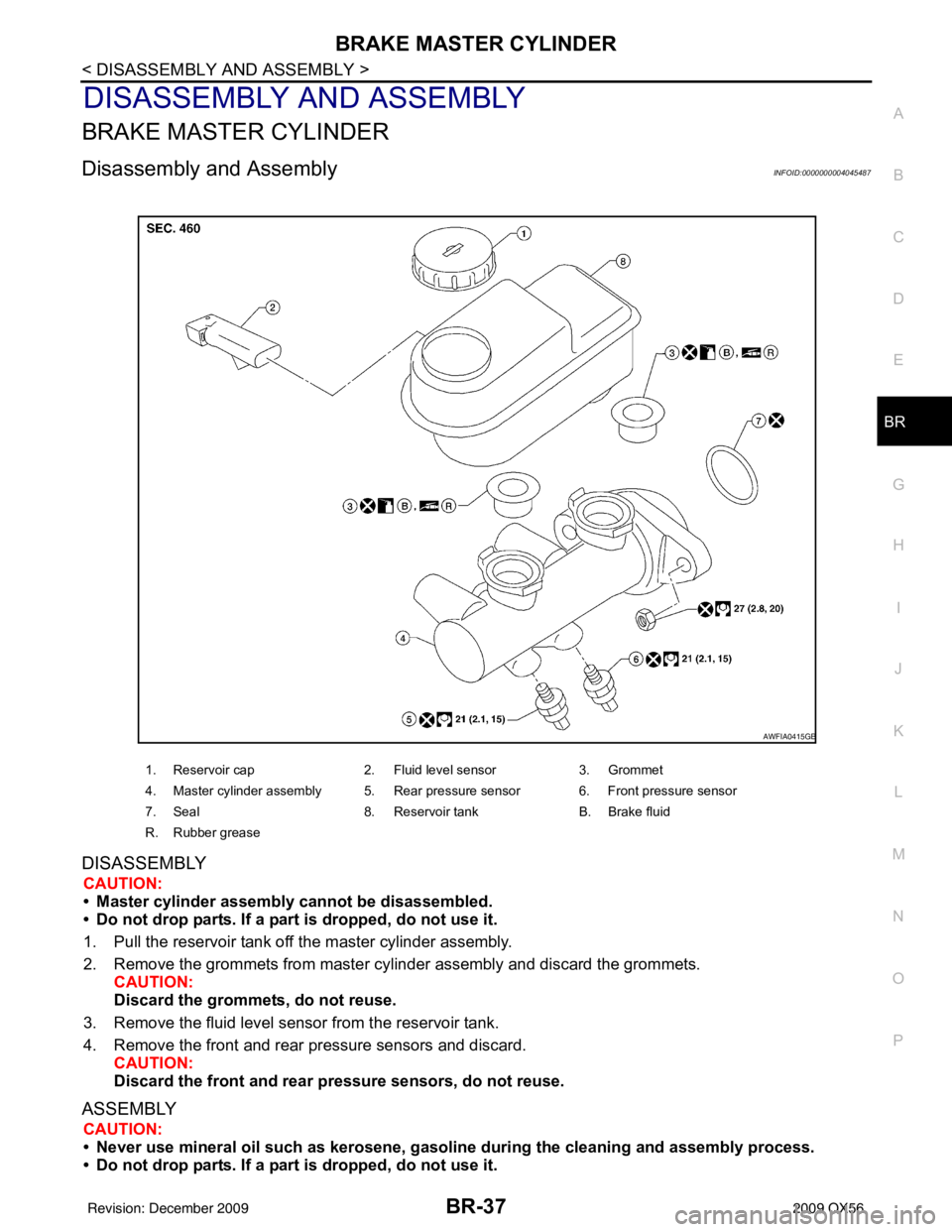
BRAKE MASTER CYLINDERBR-37
< DISASSEMBLY AND ASSEMBLY >
C
DE
G H
I
J
K L
M A
B
BR
N
O P
DISASSEMBLY AND ASSEMBLY
BRAKE MASTER CYLINDER
Disassembly and AssemblyINFOID:0000000004045487
DISASSEMBLY
CAUTION:
• Master cylinder assembly cannot be disassembled.
• Do not drop parts. If a part is dropped, do not use it.
1. Pull the reservoir tank off the master cylinder assembly.
2. Remove the grommets from master cylinder assembly and discard the grommets. CAUTION:
Discard the grommets, do not reuse.
3. Remove the fluid level sensor from the reservoir tank.
4. Remove the front and rear pressure sensors and discard. CAUTION:
Discard the front and rear pressure sensors, do not reuse.
ASSEMBLY
CAUTION:
• Never use mineral oil such as kerosene, g asoline during the cleaning and assembly process.
• Do not drop parts. If a part is dropped, do not use it.
1. Reservoir cap 2. Fluid level sensor3. Grommet
4. Master cylinder assembly 5. Rear pressure sensor 6. Front pressure sensor
7. Seal 8. Reservoir tankB. Brake fluid
R. Rubber grease
AWFIA0415GB
Revision: December 20092009 QX56
Page 468 of 4171

BR-38
< DISASSEMBLY AND ASSEMBLY >
BRAKE MASTER CYLINDER
1. Apply brake fluid or rubber grease to the new grommets, then insert the new grommets into the mastercylinder assembly.
CAUTION:
Do not reuse the grommets.
2. Install the reservoir tank onto the master cylinder assembly.
3. Install the fluid level sensor on the reservoir tank.
4. Install the new front and rear pressure sensors. CAUTION:
Do not reuse the front and rear pressure sensors.
Revision: December 20092009 QX56